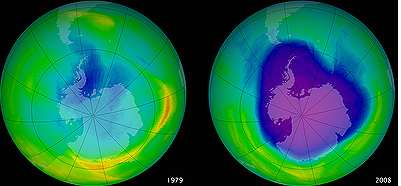Ozone holes no longer growing
The ozone holes high in the stratosphere over each of the polar regions have stopped growing due to the phase out of nearly 100 ozone-depleting substances once used in products like refrigerators and spray cans, United Nations scientists said today in a new report.
|
The Antarctic ozone hole in 1979, left, grew to encompass nearly all of the continent in 2008. [NASA] |
"Over the past decade, global ozone and ozone in the Arctic and Antarctic regions is no longer decreasing but is not yet increasing," the study finds. The ozone layer protects Earth and its inhabitants from the harmful ultraviolet rays of the Sun.
The ozone layer outside the polar regions will recover to pre-1980 levels before the middle of this century, but the annual springtime ozone hole over the Antarctic is expected to take much longer, the study projects.
The phase out of ozone-destroying chemicals is required under the Montreal Protocol on Substances That Deplete the Ozone Layer, an international agreement written to protect the stratospheric ozone layer, which last year achieved universal ratification.
The report confirms that the Montreal Protocol is working. It was published on September 16, the annual International Day for the Preservation of the Ozone Layer, to mark protocol's signature date in 1987.
Written and reviewed by some 300 scientists, the report is a joint publication of the UN Environment Programme and the UN World Meteorological Organization.
"Atmospheric levels of ozone-depleting substances could have increased tenfold by 2050," without the Montreal Protocol, said UNEP Executive Director Achim Steiner.
"This in turn could have led to up to 20 million more cases of skin cancer and 130 million more cases of eye cataracts, not to speak of damage to human immune systems, wildlife and agriculture," Steiner said.
The Montreal Protocol has "provided substantial co-benefits by reducing climate change," because many substances that deplete the ozone layer are also potent greenhouse gases, according to the report.
In 2010, the reduction of ozone depleting substances as a result of the Montreal Protocol were five times larger than those targeted by the first commitment period of the Kyoto Protocol, the greenhouse emissions reduction treaty, the report finds.
Go to Forum >>0 Comments
 Add your comments...
Add your comments...
- User Name Required
- Your Comment
- Racist, abusive and off-topic comments may be removed by the moderator.
 0
0 







